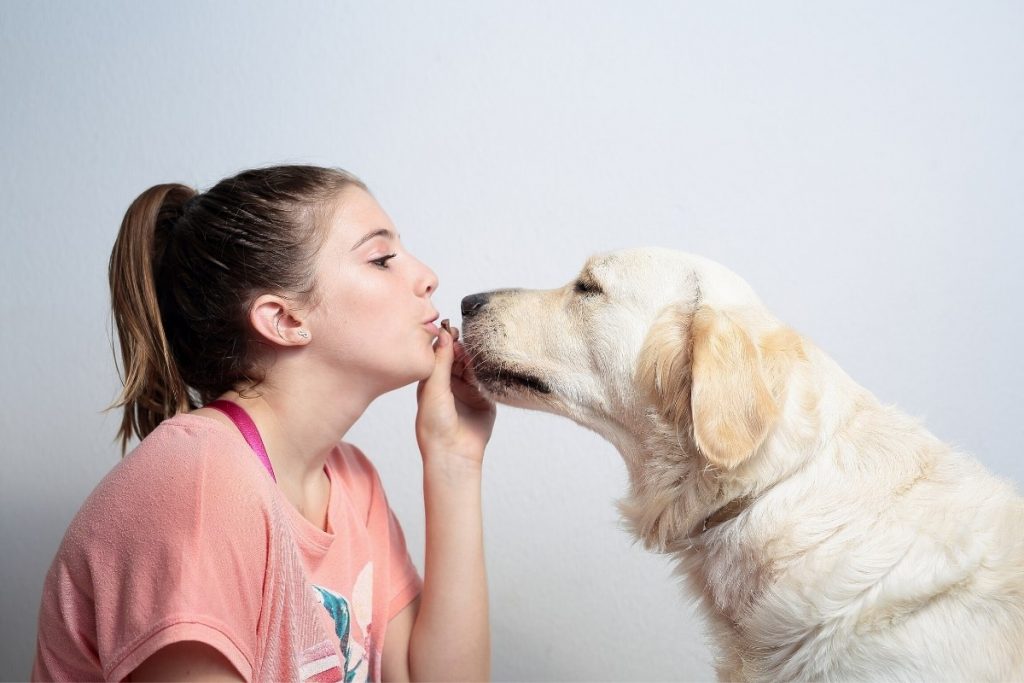
Would My Child Benefit From An Emotional Support Animal?
- Published on:
- By: ASP Team
Since he was just six months old, my son would get over-the-moon excited when he would see a bird or a squirrel on our nightly neighborhood walk. His feet would start kicking like crazy, and he’d start bopping up and down in his stroller. Now, at just over a year old, he’s still enamored by any animal we see. If it’s a dog, he immediately starts kicking, pointing, and saying, “Yes,” over and over again (meaning “Yes, I want to hug it and kiss it and make it be my best friend and never leave its side for all of eternity”).
Since the dawn of time, animals have been documented as being companions of humankind. They just have this innate, intangible quality about them that draws us near and makes us feel good. This seems to be especially true when it comes to a child’s connection with animals. Many people are familiar with service animals that can provide tremendous benefits for a child with disabilities or medical conditions like blindness, epilepsy, or hearing impairments. But for those dealing with more invisible mental health disabilities, would my child benefit from an Emotional Support Animal?
First things, first - let's clarify some things:
Emotional Support Animals are not service animals. Service animals are trained to perform a specific task to help someone, often with a physical disability like blindness or medical disabilities (like sensing seizures in someone with epilepsy). They are covered by the ADA and have a specific, well-trained skillset.
Emotional Support Animals are not simply the family pet. While your animal will undoubtedly become your child’s (and likely your) most trusted companion, he is more than just a pet. He is there to help with your child’s diagnosed mental disorder, emotional condition, or intellectual disability (like an autism spectrum disorder). While ESA’s don’t require specific training, some basic training is highly recommended, especially when the animal will be working with a child.

Get Your ESA Today
ATTENTION
Due to the new Department of Transportation (DOT) policy, Emotional Support Animals are NO longer allowed to fly in airplane cabins for free. However, Psychiatric Service Dogs are eligible.
How Do ESA's Help Kids?
The silly antics of animals can help kids smile and even laugh, releasing serotonin and other happy chemicals. When those happy chemicals are released in the brain, it can ease the symptoms of many conditions, like:
- Depression
- Anxiety and Stress
- PTSD
- Psychotic Disorders
- ADD
- Motor Skill Disorders
- Learning Disorders
- Autism Spectrum
- Disorders
These are just some of the conditions an ESA can help with. If your child is struggling in any of these areas, she may be a great candidate for an emotional support animal.

ESA’s are great for building on a child’s emotional intelligence and social skills. Caring for and responding to an animal’s needs teaches children to respect the life of another being and gives them a sense of purpose. They’ll learn more about love, loyalty, and building connections, all while using non-verbal communication. Having a pet opens the door for communication from outsiders when asking about the animal or asking to pet it. This creates a great buffer and helps ease the child into new social situations. It gives them a common interest to talk about with new people, and one they’re often plenty excited to share about.
ESAs can help reduce the effects of trauma. If your child has been through a traumatic experience, an ESA could be what carries her through it.
When children experience trauma, whether it be related to abuse, witnessing violence, or grieving the loss of a loved one, they tend to replay parts of the incident(s) in their minds. They often dwell on what led up to the incident and think if they pay close attention, they can avoid future traumas, causing undue fear and anxiety. Research has suggested an 82% reduction in trauma symptoms after just one week of having an ESA. ESA’s help with crisis de-escalation and make children feel safe and comforted while overcoming their traumatic experience. -Variations Psychology Specialists
Teen Years

ESAs can help with the awkward teen or tween years. Remember going through middle school thinking everything was horrible and the world was ending? Remember wanting to cozy up on the couch with your favorite adult to spill all the juicy details of your day and get their advice about it all? Probably not. While ESA’s may not dish out the advice like mom or dad, they can help socially anxious teens find comfort. The judge-free affection and love a pet offers the child is an emotional presence that adults may not necessarily provide.
ESAs empower children with autism spectrum disorder. An emotional support animal helps encourage development by teaching children to share, receive affection and connect with others. They also help with focussing and responding to sensory stimuli, which are common factors children with autism struggle with. Even a short play period with a live animal has shown temporary improvement of social skills in children on the spectrum.
One study showed that 94% of parents of kids on the spectrum reported that their child bonded strongly with a pet. Those who had an ESA from a young age demonstrated greater social skills than those without an ESA. Another study showed that stress was reduced by 48% when a dog was introduced. Those same parents reported that their child’s problem behaviors significantly decreased. Many of these studies focus on horses or dogs, with many opting for dogs because of ease and cost. However, guinea pigs are the up-and-comers in this game. Marguerite O’Haire from Perdue University showed that kids smile, talk and laugh more (and cry less) when guinea pigs were present.
It is, however, necessary for parents of kids with ASD to really consider if an emotional support animal is the best tool to help. Some kids may be easily agitated or sensitive to noises or unplanned activity, which means having a rambunctious dog around may be the opposite of helpful.
Will Any Animal Work?
Short answer? Any domesticated animal, yes. Emotional Support Lions, Tigers, or Bears are not allowed; they must remain in Oz. Dogs and cats are the typical choices for an ESA, but sometimes rabbits, iguanas, and the like are also used. As mentioned, guinea pigs are becoming more common as kid-friendly ESAs as well.

A few things to keep in mind when choosing the right animal for your child’s companion:
● If your child will benefit from taking his companion on outings, dog-friendly places are easy to find (restaurants, stores, etc.). Lizard-friendly areas might be a tad harder to locate.
● Will that particular animal meet your child’s specific needs? Remember, it’s not just a pet.
● Is your family ready emotionally and financially to own and care for this animal? This is a long-term commitment.
● Is your child old enough to physically and intellectually work with (and possibly care for) this animal?
Think you have it narrowed down a bit? Maybe you’re stuck trying to figure out if a dog or a cat would be best? Check out this article for help settling that age-old debate! Once you’ve decided on the type of perfect companion animal for your child, you’ll need to determine where to find your support animal.
While you’re searching for your newest housemate, you’ll want to consider some basic characteristics in regards to your new friend.
● Is he well-behaved, or will you need to train him?
● Is the house/crate/litter trained?
● Is he able to remain calm under stress?
● Will your child be able to form a bond with him?
Choosing the Right Size
The vast majority of ESAs for small children tend to be smaller breeds of dogs or cats. If your child is older, she may be ready for a larger breed. Golden Retrievers, St. Bernards, and Pomeranians are commonly seen as great breeds for an ESA.
You may be well on your way to providing a new bestie for your child, and one that can help her grow and excel in ways she hasn’t been able to before – congratulations! It’s important that you learn the rights you have as an ESA owner, but it’s (arguably) more important that you pick out just the right name!
So what’ll it be? Fido? Rex? Fluffy McFlufferson? On second thought… maybe you should let your kid decide! If you are in the process of trying to qualify for an Emotional Support Animal, we would love to help. Click the link below to begin.


The benefits of an Emotional Support Animal certification and a Psychiatric Service Dog certification are drastically different. Fortunately for you, American Service Pets’ network of active board certified doctor or other licensed mental health providers can help you find the right path to certification. To find out whether you need an ESA or PSD letter, take our easy, three-step Pet Owner Survey!
More Great Resources




